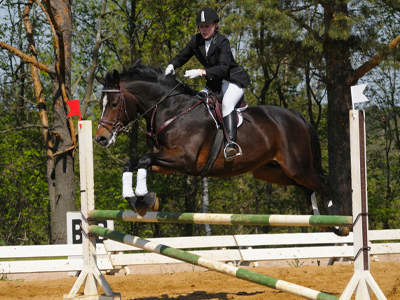What is Proper Nutrition for a Young Performance Horse?
Richard G. Godbee, Ph.D., PAS, Dipl. ACAS-Nutrition

A variety of challenges can present themselves when deciding what to feed young horses that are either in training or some other type of structured exercise program. When feeding young horses, remember that we need to supply nutrients for maintenance, growth and finally exercise (work). Nutrients that are supplied will first be used for physiologic maintenance, followed by growth and exercise.
The effect of training and structured exercise is noticeable when looking at the digestible energy and protein requirements of long yearlings and two-year-olds. A long yearling that is turned out requires 19.2 megacalories (Mcal) of digestible energy (DE) and 1.76 lb. of protein (CP) per day. If this same horse engages in a moderate exercise program, the DE increases to 25 Mcal, while protein increases to 2 lb. per day. The same long yearling going from maintenance + growth to maintenance + growth + exercise will require about 30% and 13% more energy and protein, respectfully. Two-year-olds will show a similar difference in nutrient requirement when placed in a structured exercise regime. The DE requirement for a two-year-old at maintenance is 18.7 Mcal with a protein requirement of 1.7 lb. Putting this horse in a moderate exercise program increases the DE and CP requirements 32% and 15%, respectively. To address this increase in requirements, the ratio of hay and concentrate in the diet will have to be adjusted.
Mineral requirements for this life stage follow similar trends for sodium, potassium and chloride. As exercise is increased, the requirement for each will also increase. Sodium, potassium and chloride increase 75%, 27%, 31%, respectively for a long yearling. For the two-year-old, these minerals increase 75%, 27%, and 32%, respectively. Altering the hay and concentrate may not address these increased needs without increasing other nutrients above the requirement. Incorporating the proper use of a quality electrolyte or mineral supplement may be the best solution to meeting these needs.
Adding an exercise program to the growing horse’s daily activity does not generally increase most of the vitamin requirements to a significant degree. However, since B vitamins are required for energy metabolism, their supplementation may be beneficial. In addition, increased levels of vitamin E are often recommended to help with the increased oxidative stress that accompanies exercise.
In summary:
- Young horses in a structured exercise program should receive sufficient nutrients to support maintenance, growth and exercise.
- For long yearlings and two-year-olds undergoing moderate exercise activity, they require 31%–50% more digestible energy and 13% to 15% more protein per day than non-exercised counterparts.
- Trace minerals, sodium, potassium and chloride should be increased for young horses undergoing a moderate exercise program.
The Vita Flex Pro® Edge:
Vita Flex Pro has a full line of supplements for all ages and classes of horses, including long yearlings and two-year-olds. During training or exercise, Vita Flex Pro® AccuLytes™ complete electrolyte supplement can help young horses replenish sodium, potassium and chloride, while E-5000™ products can help with the increased oxidative stress caused by exercise.
Vita Flex, AccuLytes and E-5000 are trademarks of Farnam Companies, Inc.

